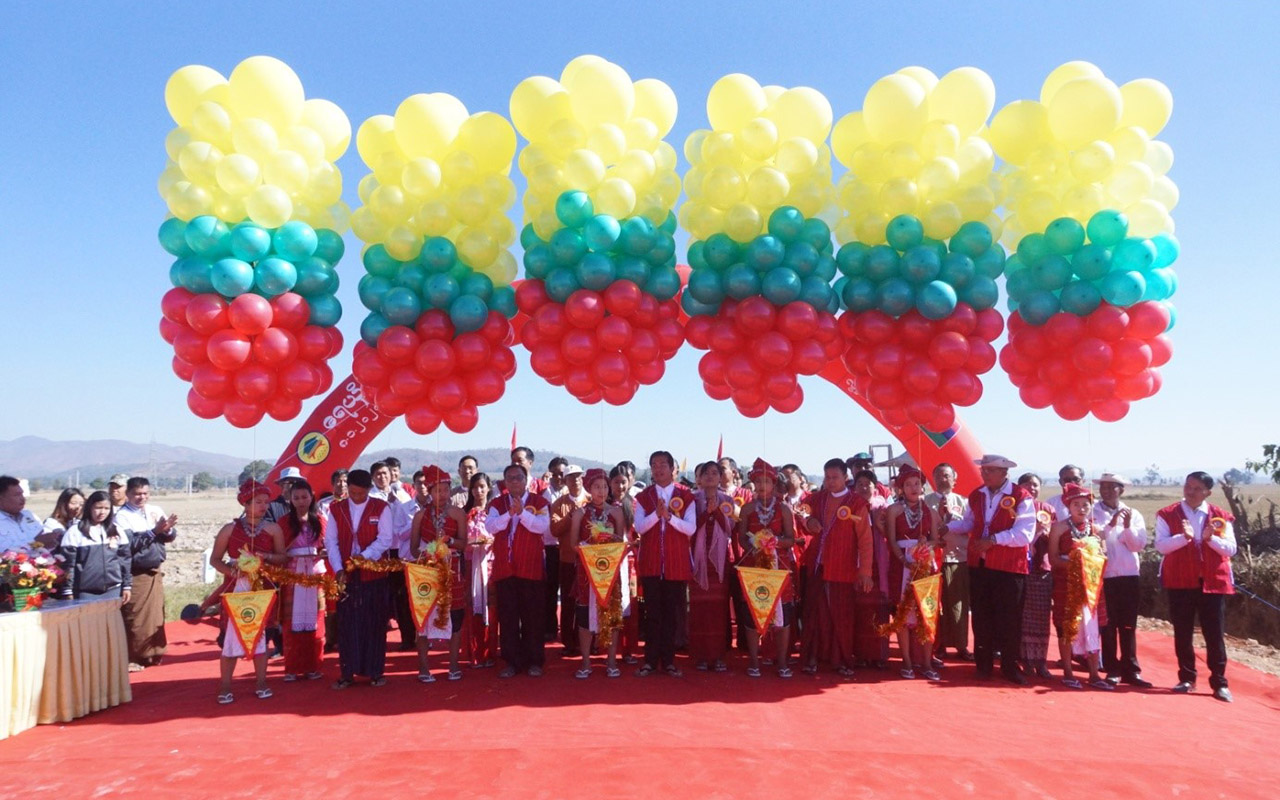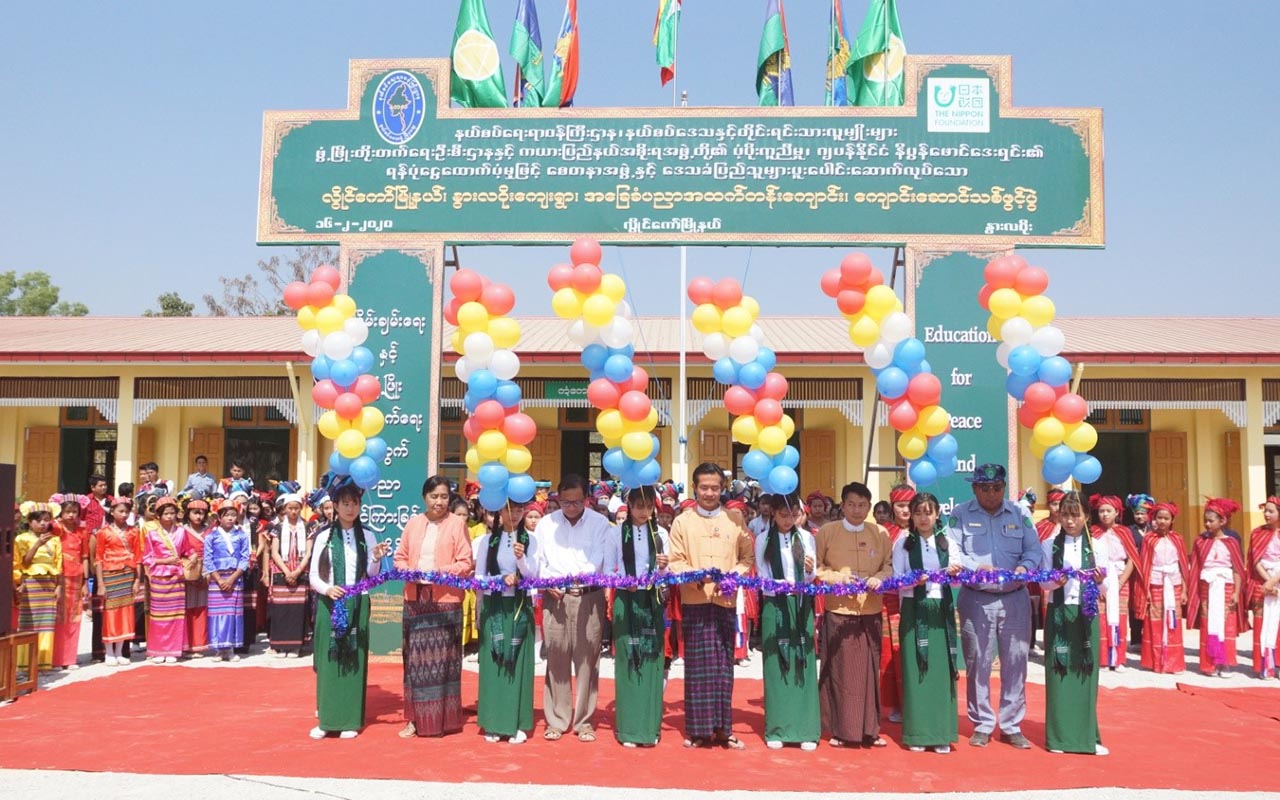Fourth-year performance of Kayah State Government
May 09, 2020
Everyone knows that Kandarawady or Ngwedaung refers to Kayah State that is decorated with natural beauties. Located in the southeast of the country, Kayah State is the smallest state among the seven states. Its area is 4529.56 square miles.
The state is 102 miles from the north to the south and 70 miles from the east to the west.
It has two districts – Loikaw and Bawlake districts- formed with seven townships and two towns. Loikaw, the capital of the state, has the Taungwe Pagoda and Myakalat and Shweletwa pagodas located on the strangely formed rock hills, apart from the natural scenery around it.
According to 2014 census, the state has a population of 286,627, and its ethnic races Kayah, Kayan (Padaung), Yinbaw, Gekho, Lahta (Zayan), Layaw, Yintalae and Kawlawmonu (Manumanaw), Bamar, Kayin, Shan, PaO and Intha. They are living in peace and harmony.
Developing tourism industry
Kayah State government made energetic efforts for rapid progress of its tourism sector. On 27 October 2016, it opened Thai-Myanmar border at its easternmost sector.
Loikaw-Maesae road, the main artery of Kayah State, is a tarred highway reaching the border with Thailand. The road has brought socio-economic development in addition to smooth transport.
Loikaw and Maehongson have been acknowledged as sister cities, and MoU was signed for mutual development of the tourism sector. The development of the sector has generated job opportunities and improved the socio-economy.
Kayah State government presented a proposal to improve the road between Loikaw and Nyaungshwe (Inlay region) in Shan State, that will be beneficial of the people of the two states.
Border trade
Maesae border trade point was opened in 2014, and a bilateral border trade road was commissioner on 27 October 2016. Hence, the volume of border trade reached USD 2.07 million in fiscal year 2019-2020.
Myanmar mostly sold agro products including garlic, onion, pepper and potato, and bought back soft drinks, instant coffee, and cement.
Maesae border is issuing individual trade certificates for the ethnic races who cannot set up a company. The system has facilitated the flow of goods to other towns of the country.
The relevant bodies are curbing illegal trade and collecting taxes on the legal goods. In fiscal year 2018-2019, the border gate earned Ks 28.065 million from tax revenues. Kandarawady Trade Centre was opened on 26 April 2016 in Loikaw. It will hold trade exhibitions, market promotion activities and trade fairs where agreement will be reached.
Hotels and tourism
As Kayah State possesses wonderful cultures and traditions, natural sceneries, it has must prospects for development of hotels and tourism sector. It has Taungwe Pagoda, Ngwedaung Dam, seven lakes, Hteepwing lake, Kyatgu cave, Hteesaekha falls, Koingan springs, Hteeprunu cave, Hsinbyutaung hill, Yaynipauk cave, Tananloh cave, Loinanpha tracking.
Motor schooner ride in Balu Creek and canoeing and kayaking at the confluence of two creeks are available in Kayah State, and preparations are been made for opening the Loikaw-Mobye sluicegate-Inlay waterway. Moreover, balloons over Loikaw and Loikaw-Moebye-Pekon RGC train ride will be available soon. Kayah State started the community based tourism (CBT) in 2016 after designating villages into specific zones. Video clips of the villages included in the CBT of Kayah State were shown at ITB- Berlin, and won Diamond Award in 2016. Kayah State also won the ASEAN Community Based Tourism Award in 2017 and the ASEAN Clean Tourist City Award in 2019. The fourth Sakura festival was observed at Buddha Park in Loikaw on 19 January this year to enhance the Japan-Myanmar friendship and increase the number of Japanese visitors to Myanmar during the cherry blossoming time. Kayah State welcomed over 75,000 local visitors and 12,973 foreign visitors in 2019. The state also conducted tourism related courses for local tour industry.
Transport
The Government has prioritized the transport sector for socio-economic development. It has fully tarred over 551 miles of roads in the state in fiscal year 2019-2020. The people-centred government built 1449 bridges in fiscal year 2019-2020. Kayah State built over 50 miles of roads in the fourth year alone.

Electricity
The No 1, 2 and 3 Balu creek hydropower plants are generating 248 megawatts. An 11Kv power cable is distributing power from the No 1 plant to nearby villages. The No 2 plant is linked with 132Kv power line and 33Kv power line.
It is providing electricity to villages in the surrounding areas and staff quarters through 11Kv power cables. Power supply reached 405 more villages in fiscal year 2019-2020. Hence, the rural electrification task increased by 93.32 per cent.
Rural development
The Government spent over Ks 9,000 million in building rural roads, bridges, water supply stations, toilets and other necessary facilities during the four years. Over 7,000 trainees completed 53 kinds of vocational education courses that were conducted for 303 times during the four years. Under the emerald green village project, a trust fund of over Ks 1,500 million was set up for 69 villages in seven townships of Kayah State. The Government also spent over Ks 134 million in implementing village development programme.
Investment
Kayah State Investment Committee was set up on 7 July 2017. Myanmar Investment Commission approved four investment projects in Kayah State during the period from 1988 to 2016. But now, Kayah State Investment Committee is issuing permits, and it has approved 18 more investment projects. Kayah State approved over USD 53 million and over Ks 24,500 million worth of investment projects during the administration of the current Government. They generated over 1,500 jobs.
Agriculture
The main crops of Kayah State are rice, maize, groundnut, sunflower, beans, sugarcane and cotton. In 2019, the state put 195,670 acres or 97.96 per cent of the target of 1,999,738 aces, under crops. Kayah State introduced the good agriculture practice (GAP) in six townships in fiscal year 2019-2020. It provided over Ks 1,700 million for agriculture development during the fiscal year. The state conducted awareness talks and trainings for farmers of 156 villages in eight townships and government employees. The Kayah State government adopted priority programmes for farming, technological dissemination, production development, natural disaster prevention, irrigation projects and infrastructure development.
Health
Kayah State is carrying out healthcare services with 500-bed Loikaw Hospital, a 50-bed hospital, five 25-bed hospitals, ten 16-bed hospitals, seven station health centres, 21 rural health centres and 120 sub-rural health centres. It has 104 doctors, 394 nurses and 455 other health staffs, and is treating and diagnosing various kinds of diseases. Local doctors also join forces with the German Interplast of Germany in treating patients. The hospitals are continuously conducting the Infection Prevention and Control under the guidance of the Ministry of Health and Sports, and also won the Patient Safety Champion award at World Patient Safety Day held in Nay Pyi Taw in 2019.
Education
Kayah State has 458 government schools, six private high schools, two private middle schools and three private primary schools, where 73,363 students are pursuing education. It has 4,218 teachers, over 16,000 students are learning ethnic languages at 368 schools, lectured by 443 teachers. Kayah State built 222 new school buildings at a cost of over Ks 10,593 million during the four years. Opened on 1 December 2019, Loikaw Education College had 320 students. Technological University (Loikaw) reached ISO 9001:2015 level recognized by England-based BVCH (SAS). Kayah State has education cooperation programmes, and conducted 12 kinds of vocational education trainings for 1,117 trainees.

Development affairs
Kayah State has one state level development affairs committee and eight township level groups. Their undertakings during the fourth year included water supply programmes, recreation parks, streets, drainages, bridges, night markets and other development facilities.
Minerals and forests
Kayah State produced over 8,000 tonnes of raw minerals during the four years. It is conducting awareness talks monthly for mining companies to observe the laws, bylaws, orders and directives and to ensure worksite safety. It also permits mini mining enterprises for local people. During the fiscal year 2018-2019, Kayah State set up 200 acres for forest regeneration, 100 acres of high value forest, over 800 acres of forest plantations and distributed samplings to the people.
Sports
During the four years, Kayah State built sport infrastructures and promoted human resources. It opened a sports and physical education institute in Loikaw. It is now conducting courses on nine kinds of sports events 206 male and female trainees.
Ethnic affairs
A total of 62,028 story books for seven ethnic races have been presented for academic year 2019-2020. Documentary on Yintalae, a minority race in Kayah State is shot. Kayah State built the combined office of the ethnic literature and culture committees of the state. Kayah State Government approved over Ks 178 million from its 2018-2019 fiscal year budget. The state government also joint hands with World Vision Myanmar, Care Myanmar, NGO Gender Group, World Education, Mines Advisory Group, Save the Children in social, cultural, health, education and many other important sectors of the ethnic affairs. As usual, challenges are faced in carrying out region development undertakings and reforms. But they can be overcome through mutual understanding and sympathy; we will surely see the prospering Kayah State dduring our national drive for democracy. (Translated by TMT)

